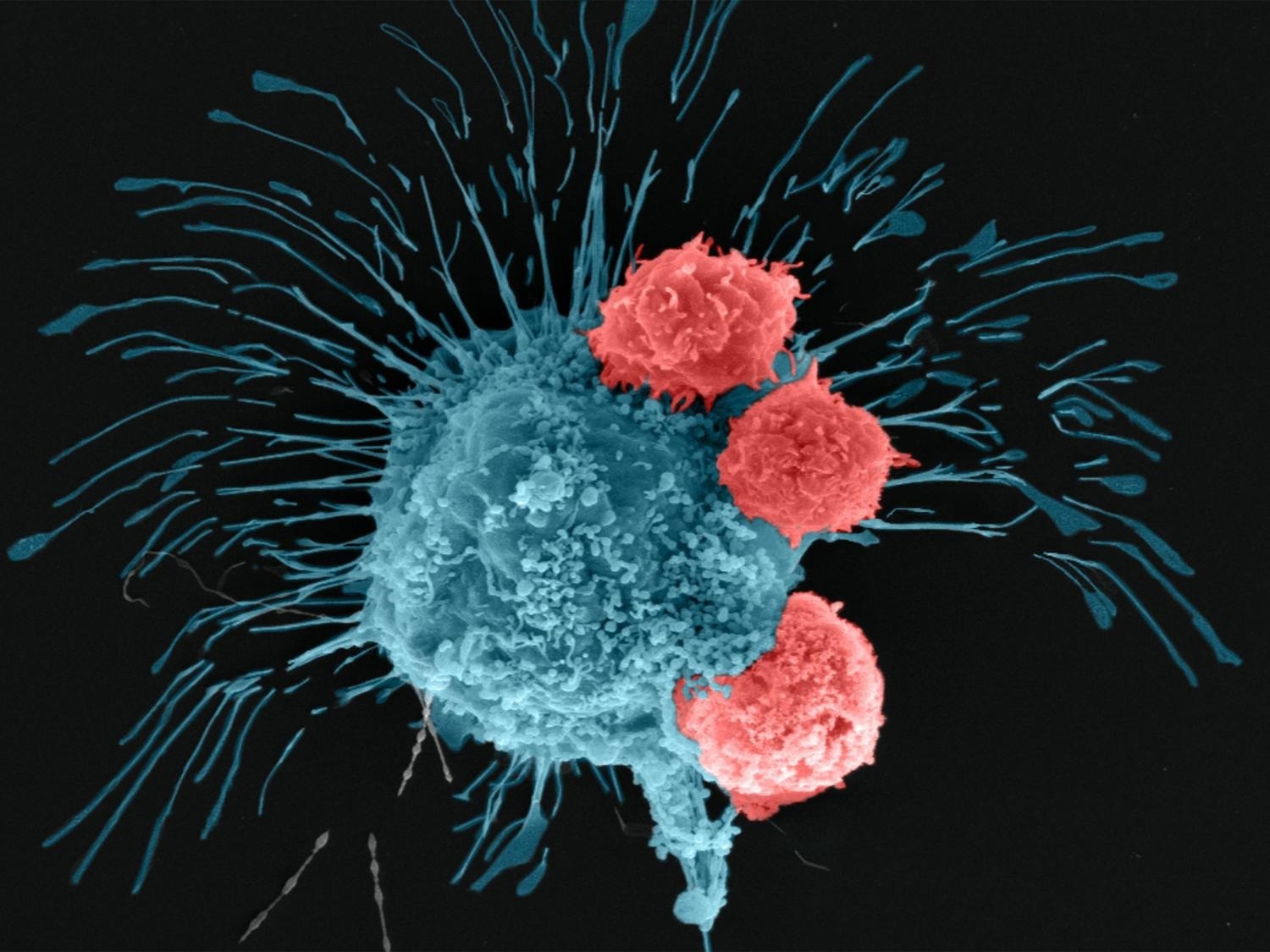In an effort to better comprehend the disease that is one of the major causes of mortality worldwide, researchers at Penn State successfully 3D bioprinted breast cancerous tumors and treated them.
 A scanning electron microscopy image shows a breast cancer cell (cyan) being attacked by T cells (red), which were engineered to recognize the cancer cells. Image Credit: Madhuri Dey, courtesy of the Ozbolat Lab/Penn State
A scanning electron microscopy image shows a breast cancer cell (cyan) being attacked by T cells (red), which were engineered to recognize the cancer cells. Image Credit: Madhuri Dey, courtesy of the Ozbolat Lab/Penn State
The achievement, a breakthrough in research, paves the way for precisely fabricating tumor models. The discovery will make it possible to research and create anti-cancer therapies in the future without using “in vivo” or “in animal” testing.
This will help us understand how human immune cells interact with solid tumors. We have developed a tool that serves as a clinical test platform to safety and accurately evaluate experimental therapies. It is also a research platform for immunologists and biologists to understand how the tumor grows, how it interacts with human cells, and how it metastasizes and spreads in the body.
Ibrahim Ozbolat, Study Senior Author and Professor, Engineering Science and Mechanics, Biomedical Engineering and Neurosurgery, Pennsylvania State University
The lab of Ozbolat focuses on 3D printing tissues for various applications in human health. Two recent articles in Advanced Functional Materials and Biofabrication highlight the lab’s use of 3D bioprinting to aid in studying breast cancer.
To precisely pinpoint tumors in three dimensions and produce the tissue, the researchers employed aspiration-assisted bioprinting, a relatively new approach. After developing a multi-scale vascularized breast tumor model out of the tissue, the researchers found that chemotherapy and cell-based immunotherapeutic affected the tumor.
By administering doxorubicin, a chemotherapeutic agent with an anthracycline base that is frequently used to treat breast cancer, to their tumor model, the team first verified the accuracy of their tumor model.
After discovering that the chemotherapeutic treatment for the bioprinted tumor was effective, the researchers worked with Dr. Derya Unutmaz, an immunologist at Jackson Laboratory, to test a cell-based immunotherapeutic therapy on the tumor.
Human CAR-T cells that had been modified through gene editing were utilized by the researcher to identify and combat an aggressive subtype of breast cancer cells.
The researchers discovered that the cells within the bioprinted tumor had triggered a favorable immune response and were warding off the cancer cells after 72 hours of the modified CAR-T cells being circulated within the tumor.
Ozbolat stated, “Our model is made from human cells, but what we make is a very simplified version of the human body. There are many details that exist in the native microenvironment that we are not able to replicate, or even consider replicating. We are aiming for simplicity within complexity.”
He continued, “We want to have a fundamental understanding of how these systems work—and we need the growth process to be streamlined, because we don’t have time to wait for tumors to grow at their natural pace.”
There are insufficient pre-clinical platforms for researching new anticancer medicines, according to Ozbolat, although cancer treatment has made significant strides. The successful clinical translation of anti-cancer therapeutics is ultimately hampered by the need for clinical studies to evaluate the effectiveness of treatments, he said.
The creation of bioprinted models could pave the way for completely novel approaches to comprehending the tumor microenvironment and the immune response.
“Immunotherapy has already been shown to be a promising treatment for hematologic malignancies. Essentially, immune cells of the patient are removed and gene-edited to be cytotoxic for cancer cells, then reintroduced into the patient’s bloodstream. Circulation is critical because the altered cells need to move around the body,” stated Ozbolat,
He further added, “With tumors, that kind of effective circulation does not exist, so we built our model to try to better understand how tumors respond to immunotherapy.”
Currently, Ozbolat and his team are using tumors that were removed from actual breast cancer patients. Tumors derived from patients will be treated with immunotherapeutics to examine how they react.
Ozbolat concluded, “This is an important step in understanding the intricacies of the disease, which is essential if we are going to develop novel therapeutics and targeted therapies against cancer.”
Madhuri Dey, Myoung Hwan Kim, Momoka Nagamine, Ece Karhan, and Nazmiye Celik from Penn State and Mikail Dogan, Lina Kozhaya, and Derya Unutmaz from The Jackson Laboratory for Genomic Medicine are the other study participants.
The immune cells used in the study were obtained commercially from a private company with IRB approval that offers leukopaks of healthy individuals in deidentified form for research use. The H.G. Barsumian, M.D. Memorial Fund, TUBITAK, the National Science Foundation, and the National Cancer Institute provided funding for the study.
Journal References:
- Dey, M., et al. (2022) Chemotherapeutics and CAR-T Cell-Based Immunotherapeutics Screening on a 3D Bioprinted Vascularized Breast Tumor Model. Advanced Functional Materials. doi:10.1002/adfm.202203966
- Dey, M., et al. (2022) Biofabrication of 3D breast cancer models for dissecting the cytotoxic response of human T cells expressing engineered MAIT cell receptors. Biofabrication. doi:10.1088/1758-5090/ac925a